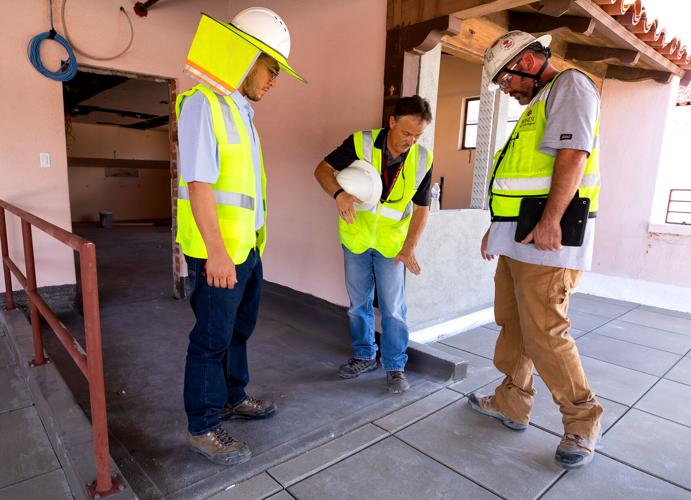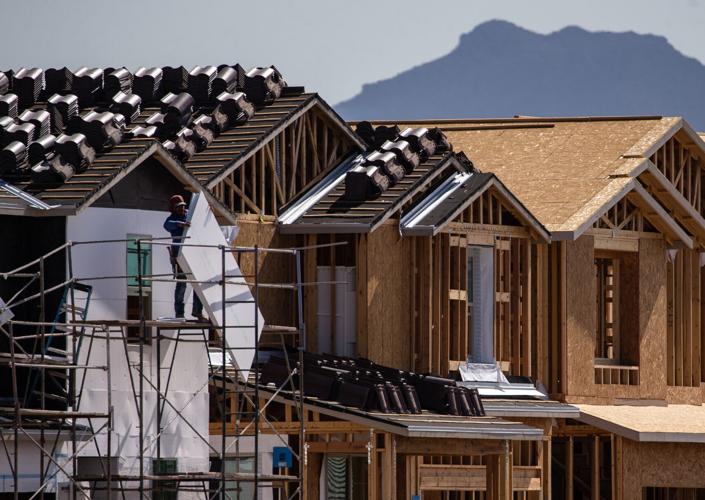A new online permitting app and streamlining should help relieve delays in building permit approvals that stretched for months in some cases last year, Tucson’s new planning chief says.
But while there’s already been some improvement, it will take time to build up the permitting capacity, Kristina Swallow, the city planning director, said Wednesday at a meeting of the Metropolitan Pima Alliance.
And a shortage of experienced permit inspectors has prompted the city to develop a program to train people with related skills or experience, the city’s senior building official says.
Overwhelmed by record-high construction activity and staffing challenges related to the COVID-19 pandemic, the city last year was taking 90 days or more to review some building permits and plans.
The city said that by May that had improved that to 20 days or less for most simple permits .
Swallow, who was named director of the city’s Planning and Development Services Department in June after serving as director of the Nevada Department of Transportation since 2019, said the city’s new self-service permitting portal, Tucson Development Center Online, offers a leap forward in efficiency and transparency.
TDC Online, which was launched in October 2022, allows users to apply for building permits, make payments, schedule inspections and track their application’s progress — or lack thereof — every step of the way, she said.
“Now all of a sudden, (project) owners know where it is in the process, and sometimes as an engineer or an architect, we’re like, ‘It’s in the city and they’ve been doing this,’ when the owners can see exactly where it is — it becomes very transparent,” said Swallow, who grew up in Tucson and got her bachelor’s degree in civil engineering from the University of Arizona and her master’s from the University of Nevada.
“On the other hand, it can really show our (the city’s) flaws and where we’re struggling, when our engineers and architects are telling the owner it’s been in the city for 30 days, 45 days and so we’ve become a lot more transparent,” she said. “I think that’s good, though, because it helps us become accountable for what we’re doing.”
TDC Online also offers various email notifications and allows the public to look up permits in process, Swallow noted.
Streamlining service
The new system already has allowed the city to streamline the process of permit invoicing and payment, which used to take two days to register, to allow same-day service, she noted.
Swallow said the city is working to build up the capacity of its permitting process, which since January has issued about 100 residential permits and 50 commercial permits on average each month.
The city receives more permit applications for both residential and commercial permits than it issues each month, but project owners often file and then don’t follow through for various reasons, Swallow said.
“Sometimes people apply and then they change their mind, sometimes people apply and then they figure out that they need more funding or financing, or they’re in a floodplain or something,” she told a crowd of about 75 attendees at the MPA breakfast event at Culinary Dropout.
Each application typically requires more than one staff review, and larger projects may require multiple reviews, Swallow noted.
Between January and June, revised and resubmitted permit applications comprised 29% of about 8,800 residential permit reviews and 46% of commercial reviews, according to city figures cited by Swallow.
After a slow start in the first two months of 2023, the city has boosted its permit output in some categories in recent months.
The city received 189 applications for residential addition or alterations permits in January, while issuing just 43, according to figures cited by Swallow. In February it received 162 of those applications and issued 88.
In March, the city caught up a bit and issued more residential addition or alteration permits than it received applications, 109 to 81, and in April, May and June combined the planning department received 438 applications and issued 347 of those permits.
The city issued permits amounting to less than half of the applications received for new model homes from January through March, then caught up in April with 81 issuances and 86 applications. In May and June combined, the city issued 137 model-home permits while receiving 197 applications.
On the commercial side, the city received 451 applications for addition or alteration projects from January through June, issuing 314 permits, while during the same period the city fielded 89 permit applications for new commercial buildings and issued 43 permits, city figures show.
While tracking those numbers is helping city administrators understand the capacity needs of the Planning and Development Services department, Swallow said the her agency is setting up a public dashboard including things like average review times per cycle for different permit types.
New review tracks
The city has set up and is still refining new “review lanes” for different types of permits and plans based on their complexity, to quickly process simple permits like residential rooftop solar and home electrical and plumbing projects, said Juan Garcia III, a city building official.
“Looking at the complexities for us, we started to move to review lanes, where we’re trying to accelerate the entire process time of course, but they’re very (common) permit types so we can get them out faster, so what we’ve done is we started with an express line, for that same day service,” Garcia said
Each of the the new lanes for permit applications include review-time goals for each:
Express Lane (same day service): Solar applications (processed in concert with Pima County through an app developed by the Department of Energy); residential trade (electrical, mechanical and plumbing permits); electrical reconnections.
Fast Lane (15-day review goal): Residential model home (from existing design template); commercial trade projects; special inspections; and building official appeals. Effective Sept. 4, the Fast Lane will also include permits for manufactured homes; residential and commercial fences; residential demolition; commercial demolition; commercial interior demolition, residential and commercial pool construction; and pool demolition.
Standard Lane (30-day review goal): Residential and commercial addition or alteration; new residential model; commercial new building; new dwelling permit; commercial solar; construction trailers; cellular tower; registered facilities like hospitals; signs; other residential solar.
Complex Lane (goal to be determined, dedicated project manager): Entitlements (projects requiring approval of city zoning changes); special or historic districts; development plans of more than three pages.
The review lanes are still evolving and some additional permit types could still be added to the Fast Lane category, Garcia said.
The Southern Arizona Home Builders Association is hopeful about the city’s permitting progress, said David Godlewski, the group’s president.
“We’re very encouraged about forthcoming improvements to the permitting and plan review process,” Godlewski said. “The concept of prioritizing the workflow and separating it into different lanes has real potential to improve the situation. Ms. Swallow’s leadership, coupled with implementing new strategies should be the difference maker.”
Training inspectors
Because the city has been unable to find enough experienced building inspectors to fill open positions, it is focusing on finding job candidates with other, relatable skills and experience and training them up on the city’s inspection code and systems, Garcia said.
In July 2022, the mayor and council approved nearly $1.5 million in funding to help the Planning and Development Services Department add staff and upgrade systems.
During a recent recruitment drive, the city hired a experienced permit reviewer from another jurisdiction who was able to hit the ground running, while also hiring an engineer with no permit-review experience, Garcia said.
“We’ve been able to start building him up, and he’s coming along, and what we realized is, that’s kind of the direction we need to take,” Garcia said. “We need to find people that are willing to learn, that have some kind of background knowledge, rather than training until we get to that point.”
Training permit applicants to use the TDC Online system is also a priority, Swallow said.
The city has offered in-person TDC Online training every week or two since January. The last scheduled session is Sept. 20, but more will be scheduled, Swallow said.
The training schedule and other information is available online at tucne.ws/tdctraining.
The city also has posted a series of YouTube videos taking users through the permitting process, starting with how to register for a free account on TDC Online.
Demolition started last week at the Foothills Mall at 7401 N La Cholla Blvd. Around 65% of the mall will be demolished but select stores will remain open during construction, including the AMC movie theater and Barnes & Noble. Video by Pascal Albright / Arizona Daily Star.





